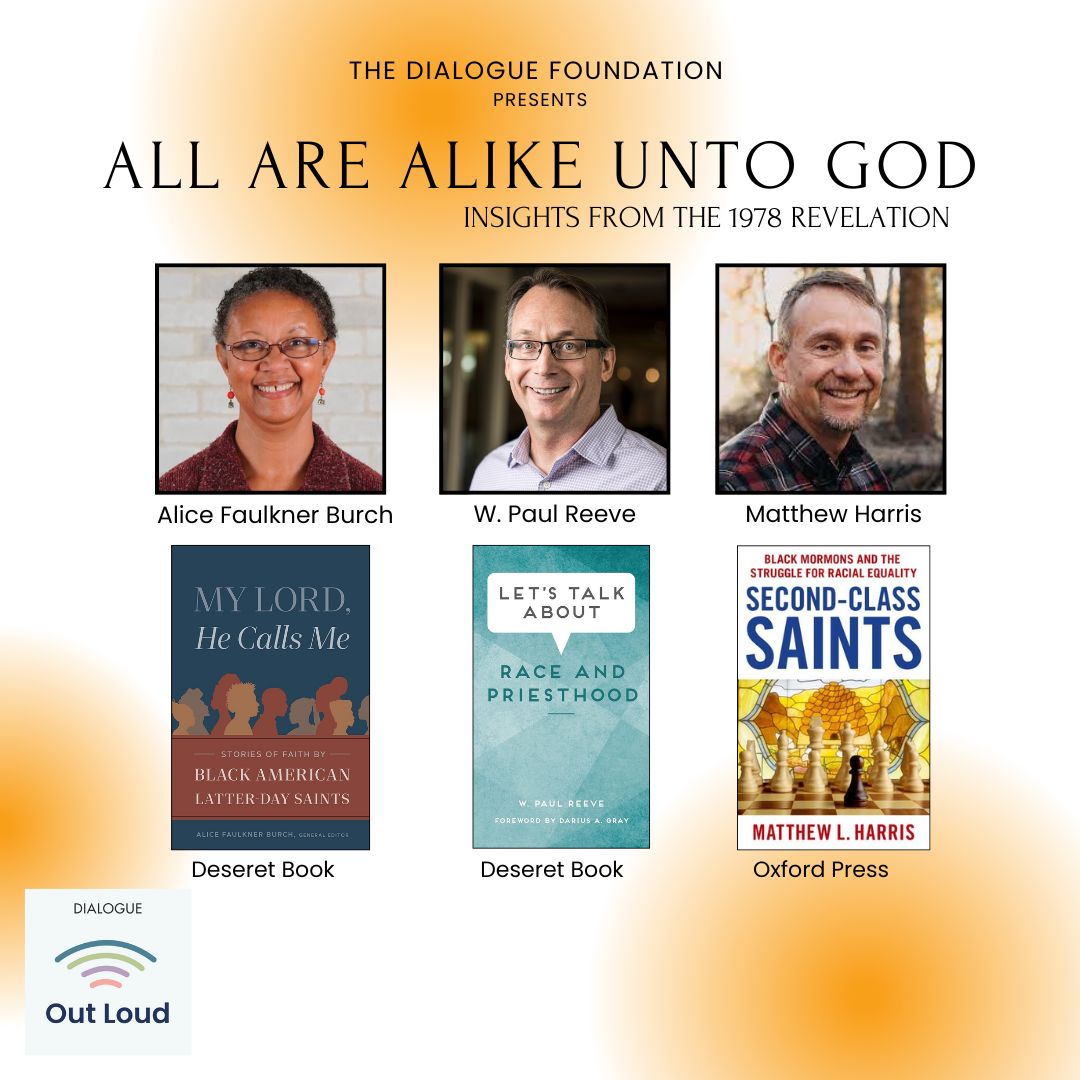In this special live-recorded episode of Dialogue Out Loud, we present highlights from the Dialogue Foundation’s April 26, 2025, event in Salt Lake City: All Are Alike Unto God: Insights from the 1978 Revelation.
This powerful panel brings together three scholars whose work has reshaped how we understand race, revelation, and institutional change in Latter-day Saint history:
Alice Faulkner Burch, editor of My Lord, He Calls Me: Stories of Faith by Black American Latter-day Saints (Deseret Book)
W. Paul Reeve, historian and author of Religion of a Different Color and Let’s Talk About Race and the Priesthood (Deseret Book)
Matthew Harris, author of Second-Class Saints: Black Mormons and the Struggle for Racial Equality (Oxford University Press)
Moderated by Dialogue Co-editor Caroline Kline, the discussion offers groundbreaking insights into the origins and aftermath of the 1978 revelation that lifted the Church’s priesthood and temple ban for Black members. The panelists examine new historical discoveries, theological reflections on the revelatory process, and the enduring question: How might this moment shape our understanding of future revelation in the Church?
Whether you’re a student of Church history, a believer in continuing revelation, or simply interested in racial justice within faith communities, this conversation invites you to consider the legacy and future of one of the most significant moments in modern Latter-day Saint history.
***
DIALOGUE’S SIXTY YEAR OLD MISSION
A brief homily by Stephen Lythgoe Bradford
Delivered in Salt Lake City, Utah on April 26, 2025 at Dialogue’s “All Are Alike Unto God” Event
I’m Steve Bradford, a Dialogue board member and a son of Mary, Dialogue’s first female editor. Dialogue’s current board chair is Rebecca England, a daughter of Gene, who founded Dialogue nearly 60 years ago at Stanford. Chris Kimball is another Dialogue board member and a grandson of Spencer, the prophet who read Lester Bush’s 1973 Dialogue article and thereafter sought and received the 1978 revelation that would more closely align The Church of Jesus Christ with the Gospel of Jesus Christ.
Rebecca, Chris and I could wax eloquently — and at length — about all that’s been accomplished in the nearly 60 years since her dad founded Dialogue — the world’s foremost independent Mormon studies journal. But we also realize I’m the only person discouraging us from mingling, socializing and leaving this comfortable intellectual setting so generously made possible by Paul Reeve and the University of Utah. I shall therefore keep my remarks mercifully brief.
I love our Church of Jesus Christ of Latter-day Saints, together with our hopeful doctrine and our glorious, expansive theology. In my mind, our church doesn’t, or at least shouldn’t, have much doctrine.
And I’m not alone in thinking this way. Jesus is recorded declaring multiple times in both ancient and modern scriptures that his doctrine is to repent and come unto him, that we are all invited to do just that, and that we shouldn’t add or subtract from that, or prevent anyone from basking in the light and love of his gospel.
On the other hand, our church has a lot of great theology, informed by our scholars and theologians. You’ve heard from a few of them here today, and there are many more in this room.
Theology for me is about cultivating ways to unify the human with the divine. It’s about seeking an Atonement with Deity and each other. And to me, one of the best places to experience that At-One-Ment is in the temple.
Now I’ll admit that, at times, I’ve been bored out of my gourd in the temple. Yet my most gratifying epiphanies — where I’ve literally felt myself communing with Deity and feeling their unconditional love for me — have also been in the temple. Our church’s limited doctrine and expansive theology should never allow our culture to deny access to the temple or any other divine blessings.
And so I’m deeply grateful for Dialogue’s key role in theologically deactivating what was once thought to be doctrine – thereby making space for our prophets to lift the hurtful temple and priesthood bans on our church’s Black communities.
In so doing, I gratefully acknowledge Dialogue’s additional role in activating a previously underused, yet irreplaceable doctrine in our scriptures — that All of us Are Alike Unto God; that our loving Heavenly Parents invite all of us, black and white, bond and free, male and female, and everyone in between, to come and partake of their supreme goodness.
And now, more than 50 years after Lester Bush’s groundbreaking scholarship, I see Dialogue continuing to be an essential player in breaking down cultural barriers to our Black, LGBTQ, and other marginalized church members’ access to the divine.
For that reason, I include, and I welcome each of you to include Dialogue in your circle of worthy causes. Your Dialogue donations will help us advance its independent engagement in humanizing our church’s theology through articles, essays, poetry, art, and other literary contributions.
More information on how to give to Dialogue is included on the back page of the booklet we’ve produced to celebrate Lester Bush and, as Greg Prince has described it, the Dialogue article that changed the church.
Your financial support of Dialogue’s steady, independent voice will be gratefully put to use; your support will be used to bolster Dialogue’s historic role as a motivator for study, reflection and even revelation; revelation that can change us, and sometimes even change the church; thereby moving us a little closer to the At-One-Ment we all yearn for within our church communities.
It’s been so great to gather and “Dialogue” with all of you today. Let’s keep it up!


 All Episodes
All Episodes